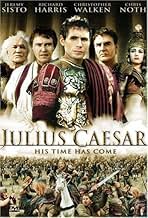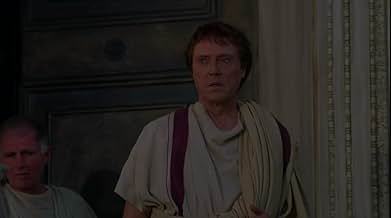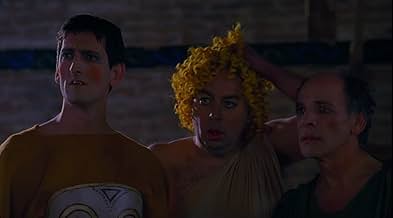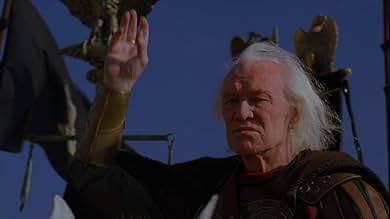Twenty-year-old Julius Caeser flees Rome for his life during the reign of Sulla, but through skill and ambition rises four decades later to become Rome's supreme dictator.Twenty-year-old Julius Caeser flees Rome for his life during the reign of Sulla, but through skill and ambition rises four decades later to become Rome's supreme dictator.Twenty-year-old Julius Caeser flees Rome for his life during the reign of Sulla, but through skill and ambition rises four decades later to become Rome's supreme dictator.
- Nominated for 2 Primetime Emmys
- 1 win & 5 nominations total
Featured reviews
The picture itself, even not indepth to the real Caesar story, gives an nice picture of the times of the roman empire. Nice acting, as well as a well combined cast, give a nice viewing pleasure.
Jeremy Sisto gives a new angel to a few on Caesar,Chris Noth (Sex & the City) gives a very good performance and Harris plays a Sulla, which you enjoy dying.
All in all, the about 3 hour mini series is a nice evening view for the family, bringing love, war/action as well as history into your living room.
The tyrant Sulla(Richard Harris) defeated to Marius and conquers Rome ,Julius Caesar(100-44 BC),as nephew of Marius,is condemned to death,but helped by Pompeius(Chris North)flees towards Orient where is kidnapped by pirates asking a ransom.When is freed,he returns to Rome where is married with Calpurnia(Valeria Golino) and begins the political career.Meanwhile,his daughter Julia marries with Pompeius and Caesar asks him his army to fight against the barbarians.But Caesar conquers whole the Gaul.The final defeat takes place at Alesia where Vercingetorix(Heino Ferch) is definitely vanquished and coerced to handcuffed parade through the Rome streets.Julius Caesar is appointed as Consul for life and crossed the river Rubicon.Pompeius and Cato(Christopher Walken) fear that Caesar will use the troops for ruling the empire and declare himself king and they flee to Greece and are defeated in Farsalia.Pompeyo escapes to Alejandria, Egypt where is beheaded by Tolomeo and Potino. Of course also is developed the usual version of the Egyptian temptress'lust for Caesar,young royal,Cleopatra(Samuela Sardo)wants to rule Egypt and she seduces the conqueror to gain the kingdom and he helps her gain control of Egypt.Later they return to Rome,but the thing don't turn out so well.An old man prevents him on the Ides of March.Caesar is murdered by his nephew Brutus(Ian Duncan) and Cassius(Tobias Moretti) and senators,starting the second triumvirate by Marc Anthony,Lepido and Octavius Augustus .The son of Caesar and Cleopatra -Caesarion- was assassinated by order of Augustus.
This stylish,visually stunning epic-scale Roman biography contains,drama,action,romance and overwhelming battles including the computer generator soldiers,though the crowd is most part by ordering ,in spite of it, still looks great.The movie displays a few top American stars in main characters somewhat at variance with an array of notable British acting talents.There are memorable performances from leading roles and the movie's wealth of expert personages-drawing extends rightly to the minor roles,one of which is played by Richard Harris,he seems terrific in his last performance.Harris whose memory the movie is dedicated but he died during the filming.Directed with imagination by Uli Edel,the picture proved that the public would go for epic series if the impact was strong and the performance attractive enough.Lovers of Sword and sandals genre and good acting will find much that is rewarding. Anothers versions about Caesar life are : The classical by Josep'h L. Mankiewicz(1953) with Brando and James Mason and by Sturat Burge(1970) with Charlton Heston and Jason Robards.
So this pulled a lot of things together for me, as history. If I had a problem with it, it was that I had a tough time keeping the characters straight. They weren't frequently enough called by name. And since most of the faces were unfamiliar the problem was even more acute.
I did recognize Richard Harris, looking absolutely GREAT in his last film role, all white and withered and glowing with inner strength and with nastiness. And Chris Noth I recognized from the early episodes of "Law and Order." He did pretty well as Pompeii, although his speech had a Brit accent that tended to come and go. Christopher Walken was both recognizable and rememberable as Cato. He's a surprisingly versatile actor. Valeria Golena was also a familiar face as Calpurnia, Caesar's second wife. (I never knew he had a first one. See what I mean?) And -- triumph of all triumphs -- I finally learned how to pronounce the name of Vercingetorix, the Arverni chieftain who led the Gauls. Speaking of him -- VercinGETorix, that is -- the actor who plays him, and whose name I don't have the opportunity to look up at the moment, gives what is for me the best performance in the movie. He is a brave, self-sacrificing, and dignified man (for a Barbarian) and the actor captures all these attributes, and has a sympatico face to boot, though by no means a handsome one. As portrayed here, if he had just been born in Gaul two millenia later, I could visualize him in an inexpensive suit dining on medallions of beef in some unpretentious bistro, with a glass of Château Neuf du Pape, using the continental knife and fork technique. As it is, he gets his head lopped off.
The story is a little confusing though. I suppose you can't stuff all of Caesar's life story into a few hours. But I missed the final confrontation between Caesar's outnumbered army and Pompey's in Egypt. We see Caesar leaving Rome with a determined expression, and the next thing we know he and his men are in Pompey's tent at Pharsalus. We are also told that Pompey's head was chopped off by the Egyptians at Alexandria, whereas some sources claim it was done by traitors among Pompey's men. It is also not entirely clear to me why some of these guys are considered military geniuses. We only get to see a single map. Pompey leaves Rome early in Part I and returns a hero. Okay. What did he do that was so hot? And we see Caesar defeat a horde of Gauls. He must have done more than that, but what? A few more maps, or exposition in some other form, however clumsy, might have helped.
It's also not made clear enough that Caesar committed an illegal act, a surprise for a guy who is shown to be so fair and compassionate and, if not exactly self-effacing, at least no egomaniac. Rome was a Republic, ruled by the Senate. It was governed by laws. The Senate ordered Caesar to disband his army and return to Rome or else be declared a traitor. By Roman law no general could bring his forces into Italy proper without the consent of the Senate. The border of Italy was the Rubicon and Caesar took his legions across it in defiance of the Senate, saying, "The die is cast." Hearing this, Pompey and some of the Senate took off for friendlier climes because Caesar by this time had a huge force with him. When he entered Rome, what was left of the Senate appointed him dictator. End of the Republic. That wasn't very nice, was it?
Oh, and another thing -- I always thought that when a Roman general returned from a victory, trailing prisoners and booty, a slave stood beside him in the chariot whispering to him, "Remember, thou art mortal," just so he didn't get any ideas like Caesar did.
I wish some of the performances had been better. Many of them are pretty weak, Mark Antony in particular. And Brutus seems too young for the part, and he's the one who looks "sicklied o'er with the pale cast of thought." In fact, he really IS pale and sweaty and a nervous wreck.
The Roman Empire finally fell apart, as everyone knows, but as it split up, there were still a lot of leaders or would-be leaders claiming direct descent from Gaius Julius Caesar. They were with us until just recently. The Tsar (or Czar) of Russia bore the title of Caesar, which is where the Russian word comes from. In Germany, "Caesar" became Kaiser, as in Kaiser Wilhelm.
Too bad we didn't get more of Caesar's accomplishments, or a better look at his weaknesses -- after all, he allowed himself to be appointed dictator without trying to reconstitute the Senate -- and there was that business with Cleopatra, a political opportunist if there ever was one. Still, it's worth watching. It's an interesting historical tale.
Secondly, there is a grave error in the summary: Brutus is NOT the nephew of Caesar but of Cato. Caesar had a very famous grand nephew named Gaius Octavian, aka Emperor Augustus, who is not depicted in the film but mentioned in the end credits.
I think it is OK for TV movie, but like most Roman films the "liberties" with historical facts annoys me. Still, it is far more correct than most of its ilk. A bit rushed at times, but fairly entertaining if you're into roman history.
Did you know
- TriviaFinal film or television appearance of actor Richard Harris.
- GoofsSulla did not die as dictator of Rome. He resigned his position in 80 B.C., two years before his death in 78 B.C. He died a slow death from liver failure while writing his memoirs, not from a sudden heart attack.
- Quotes
Aurelia: If you marry Cinna's daughter you will be identified with the popular party whether you wish or not.
Caesar: I wish it.
Aurelia: They are not our people.
Cousin: You wish to join with farmers and hagglers and beggars?
Caesar: Our family itself did not exactly drop straight out of Jupiter's ass.
- ConnectionsFeatured in Julius Caesar: Featurette (2004)
- How many seasons does Caesar have?Powered by Alexa
Details
- Release date
- Countries of origin
- Official sites
- Language
- Also known as
- Caesar
- Filming locations
- Malta(setting: City of Rome)
- Production companies
- See more company credits at IMDbPro
Contribute to this page



































